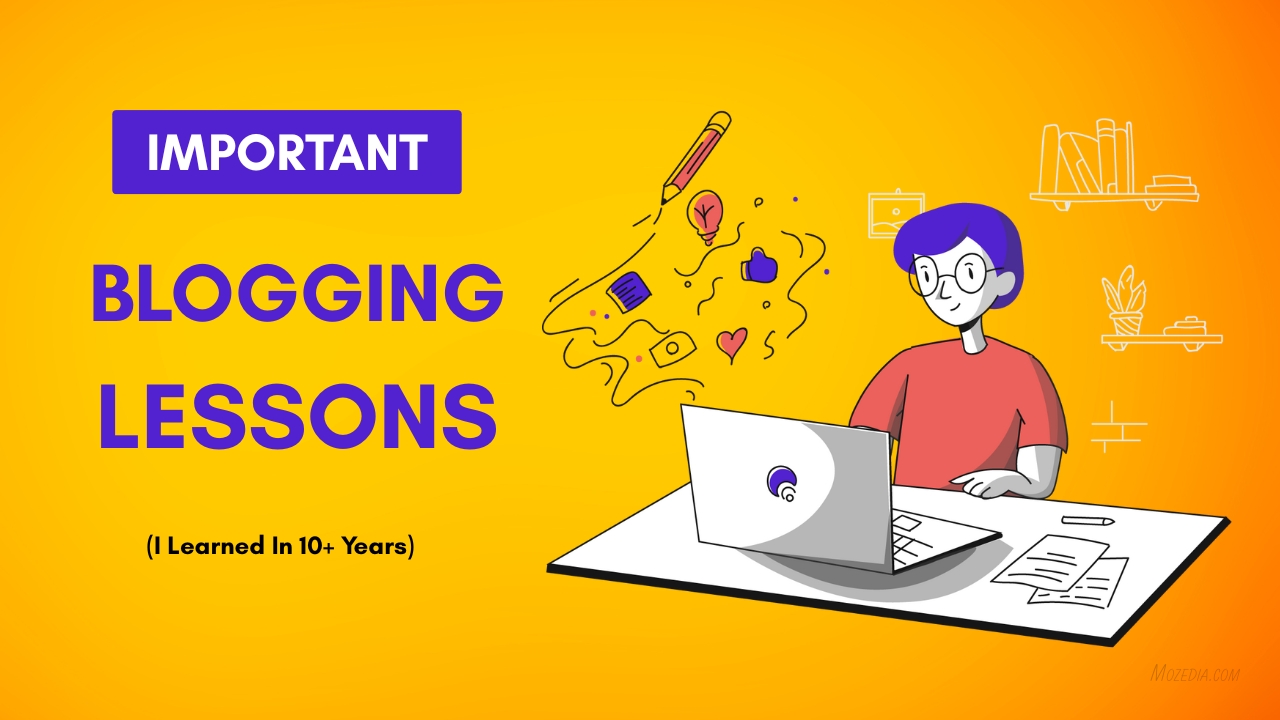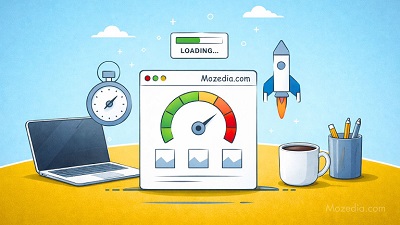Hi, I’m Jumedeen Khan, founder of Mozedia and a full-time blogger since 2015. In this post, I’m sharing 20+ powerful blogging lessons that have truly shaped my journey and can inspire you.
Blogging has changed my life. From earning my first few dollars online to building a brand that helps thousands of bloggers every month.
Now, after 10+ years in the blogging world, I want to share with you 20+ blogging lessons that are still relevant, practical, and proven to work even today.

Whether you’re a beginner looking to grow or a seasoned blogger hitting a plateau, these lessons will save you time, frustration, and mistakes.
This Journey has been full of hard lessons, unexpected wins, and powerful insights.
They’re based on real experience, not theory and my goal is simple, to help you win at blogging in the real world in 2026.
20+ Blogging Lessons That Inspire You (10+ Years of Experience)
Over the past decade, I’ve gone from writing for zero readers to building a brand that reaches thousands every day. I’ve seen trends rise and fall, algorithms change, and platforms come and go.
But what stayed consistent were the foundational principles of blogging success.
These 21 lessons are distilled from years of testing, failing, succeeding, and helping others do the same. They’re not just theories, they’re battle-tested truths every blogger should know.
1. Blogging is a Long-Term Game
Forget overnight success. If you’re not ready to invest at least 1–2 years of consistent effort, blogging is not for you. Patience builds blogs, not hacks.
One of the most important lessons I’ve learned is that blogging rewards consistency and patience, not shortcuts. If you’re expecting overnight success, you’ll be disappointed.
Sustainable traffic, loyal readers, and reliable income come with time.
It took me months to see my first few visitors and years to turn my blog into a reliable income source. You must treat blogging like a marathon, not a sprint.
I earned over $10K from blogging in 2025 and have shared my journey with explanations.
You should definitely read, How I earned $10,000 in 2025.
2. Your Blog is a Business
Treat It Like One, from the day you buy your domain, act like a CEO. Plan, invest, track progress, and always work on improving your systems.
Many beginners treat blogging like a hobby, but the real growth started for me when I began treating it like a business.
That means setting goals, analyzing data, investing in tools, and thinking long-term. From choosing the right hosting to tracking ROI, every decision should align with your broader business objectives.
3. Niche Clarity Wins
Trying to write about everything will get you nowhere. Pick a niche where:
- You have interest,
- There’s audience demand,
- You can add unique value.
Laser focus beats broad content every time.
Trying to be everything to everyone is a mistake I made early on. Choosing a clear, focused niche helped me attract a targeted audience, rank better in search engines, and build authority faster.
Don’t just blog about what you love, blog where passion meets demand and profitability. That’s the sweet spot.
4. Quality Content Beats Quantity (Every Time)
You could rank with thin content. In 2026, one epic blog post can outrank 50 mediocre ones, if it delivers value, depth, and solves real problems.
In 2015, you could get away with publishing short, low-value articles. In 2026, that simply doesn’t work. Google and readers both expect depth, originality, and usefulness.
I now spend hours crafting a single post to ensure it provides complete value. One high-quality, well-optimized post can easily outperform dozens of average ones.
5. SEO is Your Best Friend
Don’t rely on social media hype. Master keyword research, optimize on-page SEO, build internal links, and give Google what it wants, high-quality, helpful content.
Search Engine Optimization is the backbone of long-term blogging success. Organic traffic is consistent, scalable, and cost-effective.
I learned to master keyword research, optimize headings and meta tags, build internal links, and earn backlinks.
SEO isn’t just technical, it’s about understanding what users want and how Google works.
6. Design Matters More Than You Think
User experience, readability, and loading speed directly affect rankings and revenue. A clean, fast, mobile-friendly design increases trust and conversions.
A poor design drives visitors away no matter how good your content is. A clean, responsive, and fast-loading design keeps readers engaged and improves conversion rates.
After switching to a minimalist, mobile-first theme, I noticed reduced bounce rates and longer session times. A good user experience always pays off.
7. Don’t Ignore E-E-A-T
Google favors blogs with clear expertise. Use your real name, show credentials, link to trusted sources, and build author pages that speak for your experience.
Google emphasizes real expertise and trust. That means showing your real name, adding an author bio, linking to credible sources, and sharing your real experiences.
I started using my photo, showcasing my blogging background, and publishing first-hand advice. This helped build reader trust and improved my search rankings.
8. Write Like a Human, Not a Robot
Avoid keyword stuffing. Write conversationally. Be real, share your opinions, and connect emotionally with your readers. Authenticity is your strongest brand.
When I stopped writing like a textbook and started writing like I talk, my content started performing better. Blogging is about connection.
Avoid jargon and keyword stuffing. Use a conversational tone. Add stories, opinions, and emotions. People relate to people, not machines.
9. Monetization Needs Strategy
Don’t slap ads everywhere. Diversify:
- AdSense or Ezoic for passive income,
- Affiliate marketing for targeted content,
- Info products or services for scaling.
Just adding ads or affiliate links won’t make you money. Monetization requires a well-thought-out strategy that fits your audience.
I combine ad revenue with affiliate marketing and digital product sales. But I only recommend products I believe in. Building trust first leads to better conversions later.
10. Affiliate Marketing is a Goldmine (If Done Right)
Recommend only what you trust. Write in-depth guides, comparisons, and tutorials that actually help. Readers reward honesty.
Affiliate marketing has been one of my highest income sources, but only when done properly. I write in-depth reviews, tutorials, and comparisons based on real usage.
Readers can tell when you’re being genuine. Focus on helping, not selling, and the commissions will follow naturally.
11. Email List = Your Power Asset
Start building a list from Day 1. It’s your direct traffic source, immune to algorithm changes. Use lead magnets, autoresponders, and valuable newsletters.
Your email list is traffic you own. I regret not building mine earlier. Now, I use it to drive traffic, share exclusive tips, and build relationships.
Offering lead magnets like checklists or eBooks in exchange for emails has been a game-changer for long-term growth.
12. Blog Comments, Communities & Forums = Free Traffic
Engaging with your niche community builds trust, backlinks, and long-term relationships. I’ve got thousands of visits just from helpful comments!
I’ve received thousands of targeted visits simply by being helpful in niche communities.
Leaving insightful comments on related blogs, engaging in Facebook groups, and answering questions on forums not only brings traffic but also builds your authority.
13. Keep Updating Old Content
Don’t just publish and forget. Revisit old posts. Add new data, screenshots, FAQs, and internal links. Google rewards freshness.
Old posts that once performed well may drop in rankings if not updated. I regularly audit my blog, update outdated stats, refresh screenshots, and re-optimize for current keywords.
This keeps my content relevant and maintains my traffic over time.
14. You’ll Fail – And That’s Okay
Every blogger hits a wall, traffic drops, articles flop, earnings dry up. Learn, adapt, and come back stronger. I’ve started over multiple times.
Every blogger faces setbacks. I’ve had articles flop, rankings disappear, and earnings dry up. But every failure taught me something valuable.
What matters is your ability to learn, adapt, and keep going. Failure is not the end, it’s part of the process.
15. Build a Personal Brand Around Your Name
Your domain is your home, but your name is your power. People trust people, not just websites. Be visible, be relatable, and show your story.
People remember people, not websites. That’s why I always put my name and face behind Mozedia. It builds trust, authority, and a deeper connection with readers.
Your personal brand is what sets you apart in a sea of similar blogs.
16. Consistency is the Hidden Secret
Success doesn’t come from viral posts. It comes from publishing regularly, showing up daily, and staying the course.
Even when I wasn’t seeing results, I kept publishing, kept learning, and kept optimizing. That consistency compounded over time.
Blogging is about showing up even when motivation is low. One article a week for a year beats 10 articles in a single month.
17. Your First 50 Articles Will Teach You the Most
The only way to become a better blogger is to write more. You’ll find your voice, your audience, and your niche direction through practice.
Don’t aim for perfection in the beginning. Just keep writing. Your first batch of content will help you find your voice, understand your audience, and improve your craft.
Every blogger improves with practice, not planning.
18. Learn Basic Tech Skills
You don’t need to be a coder, but know how to fix small WordPress issues, optimize speed, use FTP, and manage backups. Saves money and headaches.
You don’t need to become a developer, but learning basics like installing plugins, editing themes, using FTP, and optimizing speed will save you money and stress.
I learned the hard way by relying too much on others.
19. Google Doesn’t Owe You Traffic
If your content isn’t ranking, ask: “Is it better than what’s already there?” You must earn your place, with better formatting, deeper insights, and real value.
Just publishing content doesn’t guarantee rankings. Your content must deserve its spot.
Before hitting publish, I now ask: Is this better than what’s already ranking? If not, I improve it until it is. Aim to be the best.
20. Invest in Yourself
Courses, tools, hosting, don’t fear investment. Free content only takes you so far. I invested in my growth, and that’s why I’m here in 2026.
Investing in premium tools, courses, and hosting has always paid off for me. Free tools have limitations. The right investments can save time, improve quality, and speed up growth.
I never hesitate to spend where I see clear ROI.
21. Help People First, Money Follows
Blogging is about solving problems, building trust, and genuinely helping others. Do this well, and the money will follow naturally.
When your main goal is to genuinely help readers, everything else falls into place.
I stopped chasing money and started focusing on solving real problems – and ironically, that’s when the money started coming in.
Final Words
After 10+ years in blogging, one thing is clear:
- Blogging still works in 2026.
- But only for those who treat it seriously.
If you’re just starting out or feeling stuck, remember: Every successful blogger once felt like you.
The key is to keep learning, experimenting, and most importantly, keep publishing. Real success in blogging comes from persistence, honesty, and always focusing on the reader.
Stay consistent. Stay helpful. Stay human.



Hi, Jumedeen, your article is a real eye-opener. Each lesson reflects genuine experience and practical knowledge. For anyone starting their blogging journey, this guide works like a clear roadmap.